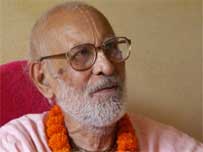Bhagavat Saptah [Part 1]
Mathura, India: 1994 (date unknown)
Sri Srimad Bhaktivedanta Narayana Maharaja
Today is the third day of our Srimad-Bhagavatam classes. We are in the midst of relating the history of Ajamila and the glories of chanting the holy names of the Lord. We see here that the holy name is so powerful that one does not require diksa (brahminical initiation), or the five activities performed before taking diksa, to assure full success. Just by naming his son Narayana, which is the name of one of Lord Krsna's incarnations, Ajamila began chanting the Lord's Holy Name. He had he taken diksa when he first spoke the name of Narayana. Furthermore, he was so fallen that there was not a single sin he had not committed. He used to take intoxication and engage in other illicit activities. Such a person uttered the name of the Lord when he named his son Narayana, and received so much benefit.
Srila Visvanatha Cakravarti Thakura says that the very day Ajamila named his son Narayana, all his sins were finished – just by his first utterance of the holy name. After that, the rest of the holy names he called out constituted his sadhana. We see that all the while he was taking the name, he continued to act unlawfully – stealing, taking intoxication and so on. However, we should not consider his behavior at this point to be sinful. Yes, these activities were going on, but they had no power in them. You can understand it like this – if you put some peas in the ground, they will sprout and grow. Now roast some peas and try to grow them. Even if you fertilize the ground with many kilos of icow dung and give it plenty of water, they will not sprout. Similarly, all Ajamila’s sins were burned, simply by his calling out the names of Narayana. Now his unlawful activities, which seemed like lowly fruitive activities in the eyes of ordinary persons, no longer constituted sin. His activities can be compared with a snake whose poisonous teeth have been pulled out. The snake still continues to bite because it is his habit, but there is no more poison. Similarly, now Ajamila’s unlawful activities had no power to give any fruits to bind him. If a rope is burnt, its shape is still there in the ashes, but when one touches the ashes, the shape falls apart and cannot be used as a rope.
The result of Ajamila chanting the names of Lord Narayana was that he attained the association of the Visnudutas, who are associates of the Lord Himself, and inadvertently took diksa initiation from them. Up to that point his chanting was called nama-abhasa (the clearing stage of chanting), because whatever else he did, he had not committed any offences to a Vaisnava. He had not disrespected the Vaisnavas in this life or any previous life. By his nama-abhasa he received the association of the Visnudutas, who gave him diksa and explained to him the full glories of the holy names.
sadhu-sanga, nama-kirtana, bhagavata sravanam
mathura-vasa, sri-murtira sraddhaya sevana
sakala-sadhana srestha ei panca anga
krsna prema janmaye e panca
(CC Madhya 22.128-129)
Srila Rupa Gosvami has promised: “One should stay in Vrndavana under the guidance of a sadhu, chant the holy names, hear Srimad Bhagavatam from the lotus mouth of a rasika Vaisnava and serve the Deity of the Lord. There is no doubt that by performing these five activities one will surely receive krsna-prema.” However, there is one condition – there should be no disrespect or offence to the Vaisnava.
This is our dilemma. We are doing hari-nama, staying in the holy place and hearing Bhagavatam, but we are not really hearing. Sometimes, some of us only act as if we are following. We speak publicly on the Bhagavatam and give instructions to others, but we do not protect ourselves from offense to Vaisnavas. Joking and laughing, we somehow disrespect or criticize Vaisnavas. The holy name (who is God Himself) cannot tolerate this. Therefore, we deceive ourselves and we are deprived of the real fruit of chanting the holy name. In this way, many lifetimes are wasted.
Therefore, be very, very cautious to avoid committing, by any means, offence to the Vaisnavas; for offense to Vaisnavas is offence to the holy name. If you see another devotee doing something wrong, do not look. There are elevated Vaisnavas who will see their faults and rectify them. You cannot do so. Just tend to your bhajana. If someone else is not doing bhajana, why are you worrying about it? Just look at your own behavior. We do not see our own faults, but we want to see others’ faults; and day and night we talk about this. Nowadays this is the fashion, and therefore we loose the chance to do bhajana.
Understand all this clearly. Wherever we see some kind of fall down, some disaster, some digression from bhajana or some material difficulties, the main cause for these is disrespect to the Guru and Vaisnavas. Ajamila was more fallen than fallen, but he did not disrespect anyone. He was sinful, but as soon as he had the association of Vaisnavas he stopped his sinful activities and was able to chant the pure holy name. Wherever there is a little bit of disrespect for the Vaisnavas, guru, saints, sadhus, the holy abodes of the Lord in this world, or the holy names, there is a decline in bhakti.
You must have heard the story of Prajapati Daksa. He cursed Sri Narada Muni, saying, “You gave my sons instructions on the performance of bhajana of the Supreme Lord, and now they have left home and family. You have ruined everything for me. For that I curse you that you will not be able to remain in one place longer than the time it takes to milk a cow.” Sri Narada became very pleased, taking this as a benediction rather than a curse. But how do other persons react? There is a Hindi saying: if you place a thorn in someone’s path, what will happen? That thorn will become three, like a trident, and will come back and pierce you. On the other hand, if you do good for others, you will be showered with flowers. We see what happened with Daksa Prajapati. He gave a curse, and by that he first disrespected the Vaisnava, then Guru and then God. Therefore, never keep bad thoughts in your mind to harm anyone. Even if someone is unjustly abusing you, just tolerate and not retaliate.
There is another very good example in the instance of Sati, also known by the names Uma and Parvati. She was wandering in the forest with her husband Lord Siva. Siva and Uma saw Lord Ramacandra crying for His wife. Because Ravana had kidnapped Sita-devi, Lord Rama was wandering here and there, calling out, “Oh, Sita! Oh, Sita!” Lord Siva saw Lord Ramacandra lamenting like this, and he paid his obeisances at the Lord’s lotus feet from afar. Uma-devi asked, “My lord, to whom are you paying obeisances?” Siva answered, “Here is my Master. Here is my Lord Ramacandra. I am paying obeisances to Him.” She questioned him, “How can He be God? He is running after His wife and lamenting. Siva answered, “That is His transcendental pastime. You can test Him, if you don't believe me.” Then Siva left.
Disguising herself as Sita, Uma went to test Rama. She stood in front of Him, but taking no notice of her, He turned away and continued to call out for Sita. She came in front of Him again and again. Finally He said, “Mother Sati, you are roaming around here alone, but Sankara has already left. How can you remain here without him?”
She came to her senses and realized that her husband had spoken the truth about Rama. Feeling very ashamed, she offered obeisances to Lord Rama and then, wherever she looked, she saw Rama with Sita and His brother Laksmana. In every tree, every shrub, every creeper, everywhere she saw Sita-Rama, Sita-Rama, Sita-Rama. She became confused and realized she had committed a very great offense. As soon as this thought came in her mind, she again saw Lord Ramacandra looking in all directions and calling, “Oh, Sita! Oh, Sita! Oh, Sita!”
This pastime took place to show that Rama is never separated from Sita. His pastime is under the jurisdiction of the Lord's yogamaya (spiritual desire) potency. This is His human-like pastime (naravat-lila). He was actually crying for Sita, but at the same time, in another prakosth (division or section of His pastimes), He is always with Her. He and Sita-devi are never separated.
Now the doubt of Uma was removed. She returned to Lord Siva, who understood internally everything that happened to her and had thus made a vow to remain silent. The demigods showered Sankara with flowers, saying, “Who can take a vow like you?” Uma-devi asked, “What vow have you taken?” He remained silent and did not reply. Somehow she came to know of her husband's vow. From now on he would respect her as his mother. Because she had doubted her guru (Lord Siva), disguised herself as Sita, and lied to her guru when he had asked her if she had tested lord Rama, Lord Siva could no longer accept her as his wife. He entered a trance for thousands of years, and Sati felt severe separation from him. She thought, "Siva has left me. He is treating me like his mother because I took the form of Sita. As long as I am in this body he will not accept me as his wife, so I will have to give up this body."
After some time, Sati's father Daksa, the son of Lord Brahma and great progenitor of the universe, began a sacrifice. Although every sacrifice is intended to please the Supreme Lord Visnu, all the demigods, especially Lord Brahma, Lord Siva and the other principal demigods, are invited and take part. However, Lord Siva was not invited to Daksa's sacrifice. The chaste Sati heard the heavenly denizens, who were flying in the sky, speak about the great sacrifice being performed by her father. She approached her husband and said, “My dear Lord, your father-in-law is now performing a great sacrifice. If you desire, we may also go.” Lord Siva warned her not to go, due to her father's enmity and envy towards him - an enmity that had begun long before, in a former Age.Now Lord Siva told Sati, “A woman can go without an invitation to see her guru or her father and mother, but if her father thinks that her husband is his enemy, then she should not go to see him. You know that your father thinks I am his enemy, although I have never considered him as such.” Despite her husband's words, Sati was determined to go. She went, but upon her arrival she observed Daksa dishonoring him. She angrily condemned her father and glorified Lord Siva in front of all present. Then, while meditating on Lord Siva's holy lotus feet, she gave up her body in a mystic fire that manifested from her heart. By quitting her body, Sati was able to disconnect herself from her offensive father and transfer herself to another body in order to associate with Lord Siva without that contamination. However, her main motive was to become free from the result of her own offenses, and again be accepted as Lord Siva's beloved wife. In her next life she took birth as Parvati, the daughter of the Himalayas. In that birth she performed austerities for many years and achieved her desired goal. Sati-devi is a pure devotee. She is the Supreme Lord's divine energy, but she was playing a role in order to give lessons to ordinary persons.
So be very careful. You may not have faith in the words of Guru; you may not believe him when he says that the holy name is non-different from Lord Krsna. Sati was not convinced when Lord Siva, who was her guru as well as her husband, said, “Oh, He is the Supreme Personality of Godhead.” She thus committed such a serious offense that she had to give up her body as a result.
We must very deeply pay attention to the words of sri gurudeva. If one neglects his words, one is bound to commit an offense. For that kind of person, gurudeva is always silent. He will not say anything to a person who neglects his words. One may hear so many good instructions, but if he has no faith in the words of guru, he will commit offenses. Whenever someone disrespects guru and Vaisnavas, or sees some fault in them, he is actually reflecting the impure feelings of his own eyes and heart onto the Vaisnavas. In reality, guru, Vaisnavas, saints and Lord Siva do not have any faults. To show this again and again, these examples from history are given.
Translators: Madhava-priya dasa brahmacari and Vraja Sundari dasi
Editor: Vicitra Dasi









